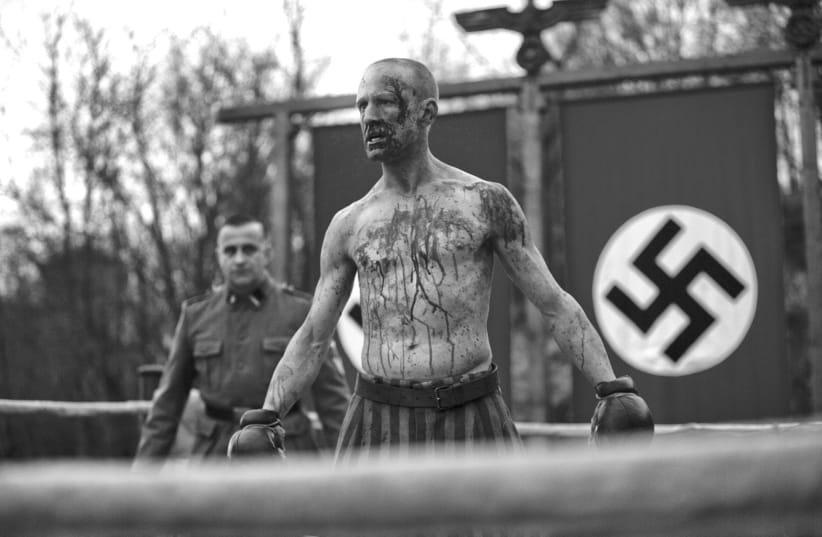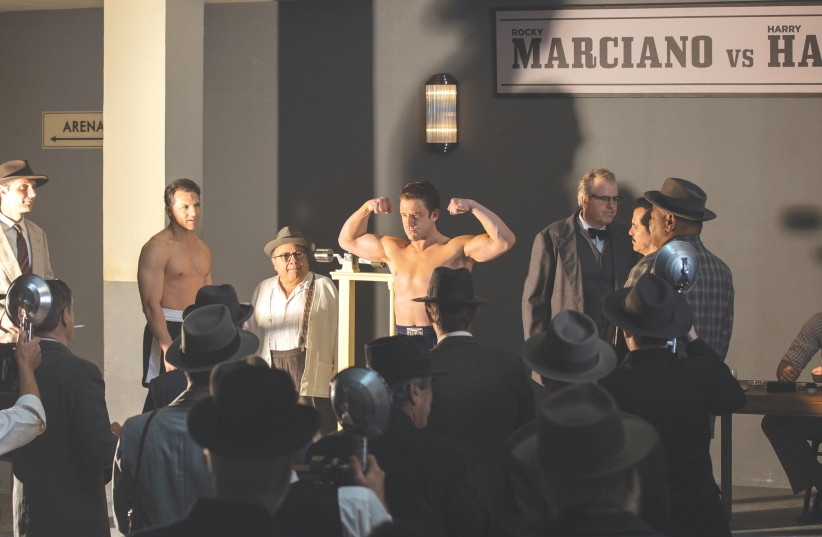The story of Harry Haft, which is dramatized by Barry Levinson in The Survivor, is incredible and true. The movie is opening throughout Israel in theaters on April 28, to coincide with Holocaust Martyrs and Heroes Remembrance Day and will also be released April 27 in the US on HBO.
Born in Poland in 1925, the Jewish young man was sent to Auschwitz and was forced to box other inmates in order to survive. After the war, he came to America and continued boxing. At one time, fought a match against top boxer Rocky Marciano, after which Haft retired and lived a quiet life, selling fruit and vegetables in Brooklyn, but his hardest fight was against his horrific wartime memories.
It’s a story that would seem to cry out for a movie version, following the publication of a biography by Haft’s son, Alan Scott Haft, which became the basis for a graphic novel by Reinhard Kleist. Barry Levinson, who has such a stellar track record as a director, would seem to be the perfect person to bring this story to life. Levinson has made such character-driven Oscar-winning movies as Rain Man and has also gravitated to disparate stories of Jewish life, such as Diner, Bugsy and Avalon.
Much of the story is moving and there are some emotionally wrenching scenes. The acting, particularly by Ben Foster as Haft, is wonderful, but the movie is told in a literal way that is not as imaginative as many of Levinson’s other movies.
The guards actually did force Auschwitz inmates to box, which was detailed in several other films. These include last year’s The Champion (a.k.a. The Champion of Auschwitz), about pre war Polish boxing champion Tadeusz “Teddy” Pietrzykowski, and the 2013 movie, Victor Young Perez, about a Tunisian Jewish boxer who became the World Flyweight Champion in 1931. Perez boxed while in the death camps and was killed on a death march in 1945.
The Survivor is a much higher-profile film than these other two and it is anchored by Foster’s tour-de-force performance, in which he undergoes a physical transformation that rivals any that other actors have pulled off, including Robert De Niro in Raging Bull and Christian Bale in The Fighter. Not coincidentally, De Niro (who gained weight for his Raging Bull role) and Bale (who thinned down) were playing boxers and they also won Oscars for these parts. Oscars have often gone to actors playing boxers, including Sylvester Stallone as Rocky, and Foster looks poised to get a Best Actor nomination in 2023.
He is convincing both as the concentration camp inmate, where he is emaciated and virtually unrecognizable, and as the tormented but determined survivor in post-war New York. Foster, who appeared in Leave No Trace and Six Feet Under has never been better and is especially good at playing the scenes, both during and after the war, where Haft expresses his anger.
THE PLOT moves among three timelines, one where Haft has an important encounter in the early ‘60s that affects how he talks to his son about his wartime experiences, the second in the late ‘40s in New York, where Haft sets his sights on boxing Marciano and the third, of course, during the war, mainly in Auschwitz. The concentration-camp and war scenes take us back to the Schindler’s List cinematic universe, where everything is in black and white and everyone speaks English in various accents.
I understand the importance of getting the story of the Holocaust across and I acknowledge that having films in English will draw a larger audience, but after seeing more realistic – and more devastating movies – notably Laszlo Nemes’ Son of Saul, which looked like a documentary and about which I still have nightmares, it is hard to readjust to the more artificial, traditional screen depiction of the Holocaust.
The first half of the film is the best and it well paced. Early in the film, we see Haft become separated from his childhood sweetheart, Lea (Israeli actress Dar Zuzovsky) and then chosen by a guard to box in the matches at Auschwitz which provided entertainment for the staff and on which the guards wagered money. These matches were a fight to the death and each opponent Haft vanquished was shot. But all he cares about is surviving so he can return to Leah. When, as a reward for one of his victories, he is given the chance to spend an hour with a prostitute inmate, all he wants to do is ask her if she knows whether Leah is alive.
After the war, he visits a rabbi’s office every day to see if there is any word on Leah, which was one of the main ways news of the deaths circulated in those days. Angry that the rabbi has not learned anything yet, he attacks the man, who is rescued by his assistant, Miriam (Vicky Krieps, the statuesque actress from Luxembourg who starred in Phantom Thread and Bergman Island) and she and Haft strike up a tentative friendship. Haft talks to his brother, Peretz (Saro Emirze), the only other survivor from their family, about his inability to shake his traumatic memories. “It keeps going on in my head and I can’t stop it,” Harry says and his brother counsels him to move on and forget.
You might wonder, given his traumatic memories, why Harry continues to box once he is in America, but it turns out that his master plan is to become famous, so Leah will hear of him and find him. He is billed in the ring as a survivor of Auschwitz.
“I feel she is alive,” he says, a feeling that, oddly, deserts him later after he receives a significant clue to her whereabouts. When a journalist (Peter Sarsgaard) offers to interview him, Peretz cautions him to refuse, thinking that others in the survivor community will turn against him when they learn his opponents in the death camp where murdered after they lost to him, but he goes ahead and does the interview anyway.
The reactions of other survivors to this interview are negative, but this plot turn is quickly dropped. When Leah does not turn up following the publication of the interview, he decides to challenge Rocky Marciano (Anthony Molinari), one of sport’s up and coming boxers, to a match that he hopes will get publicity. He trains hard with his coach (John Leguizamo) and even gets pointers from one of Marciano’s trainers (Danny DeVito).
But he is plagued by flashbacks and other symptoms that would probably be diagnosed as Post Traumatic Stress Disorder today. The film reveals more of his story at Auschwitz as he starts to make peace with his postwar life and weighs the decision about how much to share with his children about his past.
As it goes on, the movie begins to lose momentum. Haft’s descriptions of the trauma from which he is suffering should be the most affecting part of the movie, but they are repeated a great deal to diminishing effect. It felt almost as if the movie either should be tightened up or should have been adapted into a television series in which each chapter of his life was examined in greater depth. The story has power and there are many affecting scenes, but it gives the feeling of having gone through dozens of versions that, at times, do not blend together gracefully.

